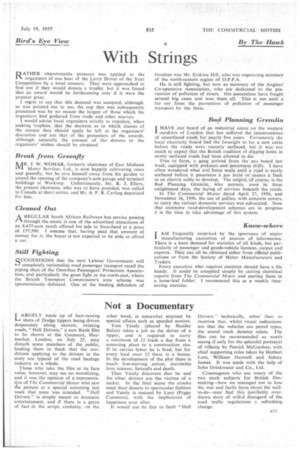Not a Documentary
Page 55

If you've noticed an error in this article please click here to report it so we can fix it.
LARGELARGELY made up of hair-raising LY of Dodge tippers being driven desperately along narrow, twisting roads, "Hell Drivers," a new Rank film to be shown at the Gaumont, Haymarket, London, on July 25, may disturb some members of the public, • leading them to think that the conditions applying to the drivers in the story are typical of the road haulage industry as a whole. Those who take the film at its face value, however, may see no moralizing, and it was the opinion of a representative of The Commercial Motor who saw the picture at a special screening last week that none was intended. "Hell Drivers" is simply meant as dramatic entertainment, and if there is a grain of fact in the script, credulity, on the.
other hand, is somewhat strained by special effects such as speeded motion, Tom `lately (played by Stanley Baker) takes a job as the driver of a tipper, and is required to carry a minimum of 12 loads a day from a screening plant to a construction site. If he carries fewer he is fired, but for every load over 12 there is a bonus. In the development of the plot there is much fast-moving action, inevitable love interest, fisticuffs and death. Then 'lately discovers that he and the other drivers are the victims of a racket. In the final scene the crooks meet their deserts in spectacular fashion and 'lately is rescued by Lucy (Peggy Cummins), with the implication of happiness ever after. It would not be fair to fault "Hell Drivers" technically, other than to mention that, whilst visual indications are that the vehicles are petrol types, the sound track denotes oilers. The film can be recommended as worth seeing if only for the splendid portrayal of villainy by Patrick McGoohan, with chief supporting roles taken by Herbert Lorn, William Hartnell and Sidney James. It was made with the help of John Drinkwater and Co., Ltd.
Cinemagoers who are weary of the two stock subjects for British filmmaking—how we managed not to lose the war and facile farce about the wellto-do—may find this justifiably overdrawn story of wilful disregard of the road traffic regulations a refreshing change.




























































































